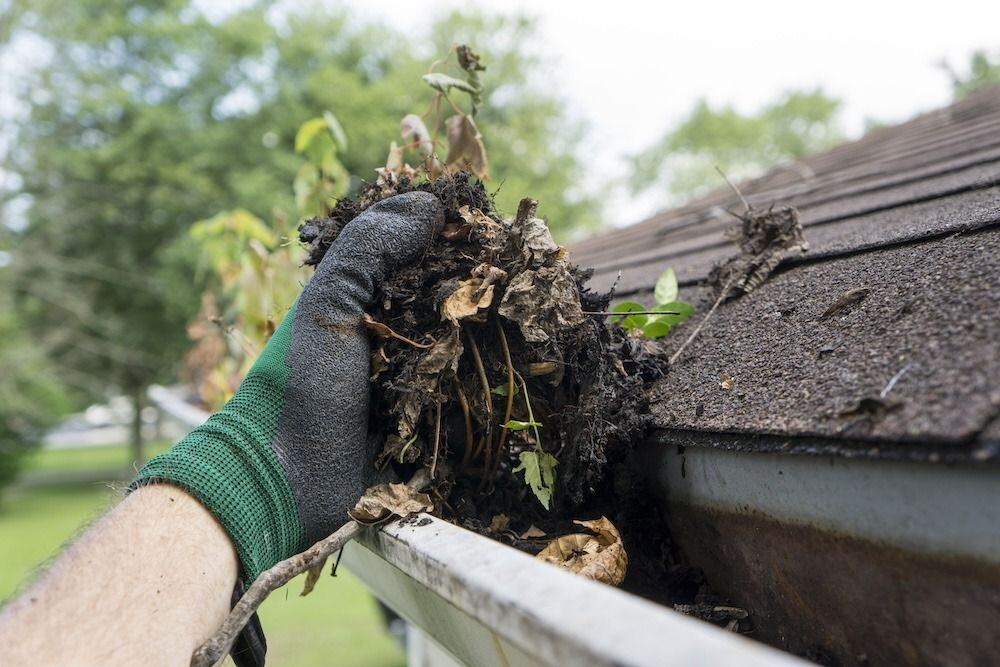
Learn how cleaning the dirt and built-up debris from your gutters can save you money and headaches in the long run.
Cleaning mud, wet leaves, and other not-so-pleasant debris out of the gutters isn’t the way most people want to spend a day off.
However, keeping up with gutter maintenance is crucial to preserving your home’s roof, exterior, concrete, and foundation.
So, do you have to clean your gutters? The short answer is: YES!
In this article, we’re going to explain why this is the case. (Hint: It can save you thousands in repairs to your foundation and concrete over time!)
Why Cleaning Your Gutters Is Important
Gutters play a huge role in diverting water away from your foundation and the concrete around your home (think porches, driveways, patios, etc.)
Neglecting your gutters might seem like a minor oversight, but it can lead to costly water damage and foundation repairs.
Here are some potential problems you could face if you don’t clean your gutters regularly:
-
Sinking Concrete
When gutters are clogged, they overflow, directing water onto the concrete slabs below. Over time, this excess water erodes the soil underneath the concrete, causing the slab to settle unevenly or creating dangerous voids beneath it.
Related Resource: Uneven Concrete? Here Are 4 Ways To Fix It
-
Leaking Roofs & Basements
A well-maintained gutter system is crucial for prolonging the life of your roof. If you ignore gutter cleaning, water will accumulate on the roof, seep through the shingles, and cause leaks.
The same risk applies to your basement. Clogged gutters prevent water from being diverted away from your foundation. Instead, they will overflow and can seep down into the basement.
Editor’s Note: I just bought a fixer-upper with a leaky block-foundation basement. Since cleaning out the VERY dirty, clogged gutters that were always overflowing right into one corner of the home’s foundation, we haven’t seen water back in the basement!
-
Cracked Foundation
Foundation repairs can be a significant investment, quite a hassle, and often a necessity when it comes time to sell your home. Gutters and downspout extensions are designed to move water away from your home, helping to prevent foundation cracks.
In winter, water can freeze and thaw in your foundation’s vulnerable spots, potentially making cracks worse and repairs, waterproofing, and mold remediation necessary.
-
Yard or Landscaping Damage
Improperly functioning gutters can also lead to water pooling in your yard. Excess water can cause root rot in your lawn, flower beds, and plants.

How Often Should You Clean Your Gutters?
Generally, you should clean your gutters twice a year: once in the spring and once in the fall.
However, if you have many trees close to your home or it’s been a particularly rainy year, you may need to clean them more frequently.
Watch for signs of poor drainage, such as pooling water or overflowing gutters, to know when it’s time for a cleaning.
Pro Tip: Depending on your home’s size and shape, it might not be practical or safe to check and clean your gutters yourself. In this case, calling a professional is the best route.
Do You Still Have To Clean Gutters With Gutter Guards?
Yes, even if you have gutter guards, you should still clean your gutters and the guards twice a year.
Although gutter guards do help keep debris out of the gutters, they can still let some in little by little. Over time, the gutters can become dirty and clogged, which is why it is still important to clean them out twice per year, even with guards.
Editor’s Note: Our new home’s gutters thankfully had gutter guards installed, but when we lifted them off, we found the gutters below full of mud, wet leaves, and compacted dirt. We even had a plant growing up through one of the holes in the gutter guards!
Should You Clean Your Gutters?
Here at A-1 Concrete Leveling, we’ve been lifting concrete that settled due to overflowing gutters for over 30 years, so we know for a fact that this maintenance practice is important.
While gutter maintenance may not be your favorite chore, it’s essential for preventing significant expenses and headaches in the future.
Remember, regular cleaning helps prevent sinking concrete, roof leaks, foundation cracks, and yard damage.
Read Next: Concrete Maintenance Calendar - When and How To Maintain Concrete
Sarah Etler joined A-1 Concrete Leveling after receiving her Bachelor of Arts degree in English from Northern Kentucky University. As A-1's Content Marketing Manager, she works closely with industry experts to produce content that will best answer questions related to concrete repair and maintenance practices. Sarah loves living a life full of discovery and is excited every day to see what new things she can learn and share with those around her.
Topics: